WIE Lead Fosters Leadership in Illinois' Women in Engineering
March 22, 2016
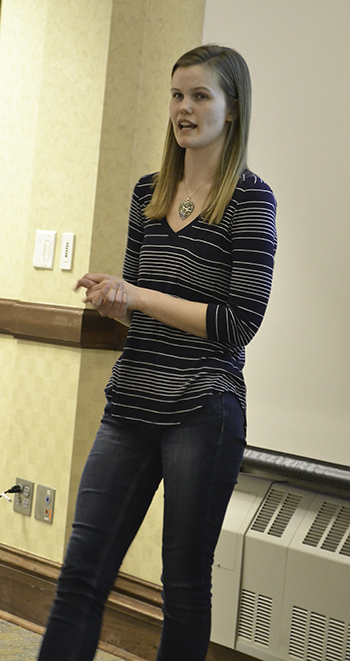
Engineering alumnus Sarah Laken gives a talk about Collaboration.
“I just want to ensure that these women have a chance to develop these additional personal skills, professional skills, so they feel empowered to be leaders.” Angie Wolters
The Women in Engineering (WIE) organization in the College of Engineering prepares women to succeed in engineering. While a major focus of WIE is to help them be successful at Illinois, the organization also seeks to help them be successful beyond Illinois by providing them with the skills they will need to get ahead in their future careers. So in the 2015–2016 academic year, WIE leaders began a new leadership series called WIE Lead, which features monthly workshops highlighting students, faculty, and alumni who share their stories about how they've grappled with specific leadership principles.
According to Angie Wolters, Associate Director of WIE, some of the leadership qualities they’re addressing in the workshops are topics that often don’t get talked about in class.
"Our engineers are leaving with extremely strong technical skills, and it’s the addition of these kinds of programs that make sure that we’ve got a balance between those technical skills and the ability to work with others and go in and find those opportunities to be a leader. So I’m excited about this, because I really look at it as a personal, professional kind of development that sometimes students really wouldn’t get until they’re in the workforce, but we’re focusing on it now.”
The WIE Lead series, funded by corporate sponsor Northrop Grumman, is based on the Athena Core 10, developed by Barnard College’s Athena Leadership Center, which addresses ten principles of leadership for women. In fall 2015, the topics addressed were vision, ambition, advocacy, and resilience; in spring 2016: collaboration, negotiation, and communication.
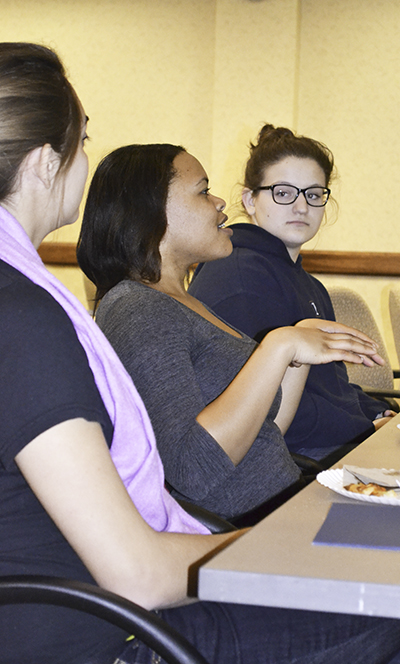
An engineering student makes a comment about collaboration during Laken's talk.
For instance, for the February 16th WIE Lead, a former student, Sarah Laken, who currently works as a research scientist at Eli Lilly, returned to give a talk on “Collaboration.” Laken, who served as a WIE Orientation leader as a student, and also an officer in SWE, was excited to come back to campus to share some of what she's learned with Illinois' engineering women: “I learned a lot on campus, and it really set me up well for my job, and so I’m really glad to be able to give back to the community that gave a lot to me while I was here.”
During her talk, Laken shared about the five stages of the collaboration process (Forming, Storming, Norming, Performing, Adjourning), then addressed some of the challenges she has encountered in her new job related to collaboration with colleagues. She also shared with current students several annecdotes, including one about a colleague who hadn't been extremely cooperative, and some strategies she's developed to remedy the situation. Throughout the talk she imparted to the students some of the wisdom she's picked up as a result of working through struggles when learning how to collaborate with colleagues.
"I have a philosophy that I truly believe in. There's a nice way to say everything. So no matter how harsh it may be, I think there's a nice way to say it. It doesn't always mean you say everything on your mind....So if there is contructive criticism you can give to a group member, you don't necessarily have to bash them, saying, 'You did this wrong, and this wrong, and this wrong!'...but instead, when you give that feedback, have it be true feedback. Say, 'This didn't work well, but I think if we tried it this way next time, it might work better.'"
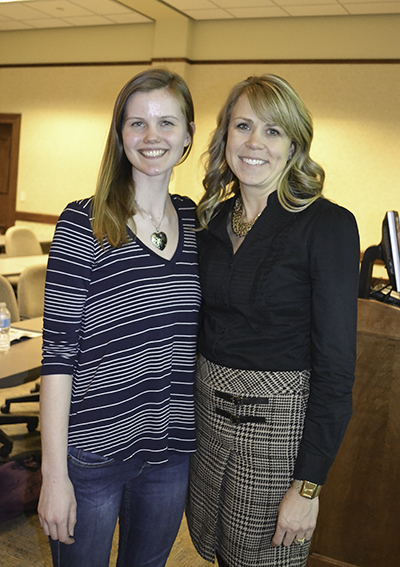
Sarah Laken and Angie Wolters.
Another piece of advice? "When giving feedback, avoid the word 'You' as much as possible. If you can avoid it entirely...do it!"
Laken then shared a hypothetical situation illustrating how to deal with conflict using some of the above tips. Suppose one's roommate were, say, leaving her dirty dishes in the sink all the time, what is a nice way to deal with the issue without calling said roommate a slob? Putting a friend on the spot, Laken uses her in the example:
“I’d say, ‘Tara, I don’t like washing the dishes right before I use them, so maybe if we can try to wash the dishes before we go to bed every night, then we can have nice clean dishes when we wake up in the morning, and we don’t have to worry about washing the dishes right before we use them.’”
Laken then goes on to stress that she hadn't used the word "you" at all when confronting her roommate, but had said "I" and "we."
While Laken admits that being an engineer isn’t quite what she had envisioned, she feels she was well-prepared at Illinois. “It’s definitely very different. But I think there are a lot of aspects that I enjoyed in school—the collaboration, the teamwork, and the problem solving—that I definitely do use every day at my job.”
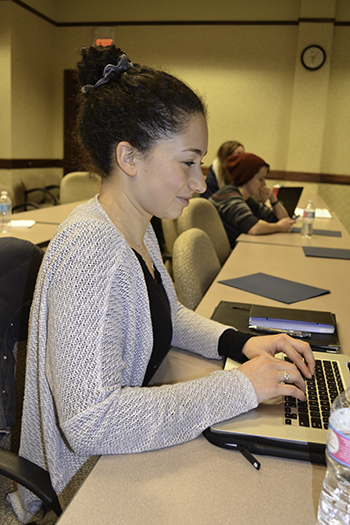
A WIE Lead participant completes an online survey about what "animal" she is based on her personality.
Following Laken’s talk and a question-and-answer period, participants took a short personality test to determine what kind of “animal” they were, based on their personaity characteristics, then did a hands-on activity, which involved teamwork and collaboration: building a spaghetti-marshmallow structure. After the activity, they discussed the successes and challenges the teams had encountered while collaborating on the activity.
According to Wolters, around 30–40 students, ranging from freshmen through seniors, have beenattending the workshops. In fact, some upperclassmen who are established leaders have been participating and sharing some of what they've learned with the younger students, contributing a kind of mentoring component to the program.
“It’s added to the great dynamic of our own current leaders mentoring some of the younger students,” says Wolters.
In essence, the monthly topic has almost become a Women in Engineering mantra for the month. For instance, women who are unable to attend the workshops can still engage with these topics via the tidbits and the stories included in WIE’s monthly newsletter sent to all women in the College of Engineering. Also, WIE Advisory Board representatives from WIE’s RSO (Registered Student Organization) groups (SWE, Women in Nuclear Engineering, Women in Aerospace, etc.), share the monthly themes with their organizations, who have keyed in on the topics being covered and continued the conversation in their own events, such as TED talks and the speakers and alums that they have coming back to do talks.
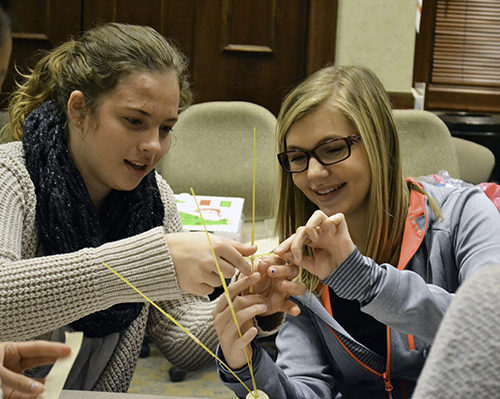
Two engineering students at WIE Lead practice collaborating during a hands-on activity.
Another related leadership initiative WIE has begun is the Women in Engineering Leadership Certificate. Female engineering students must attend at least four WIE Lead workshops, plus do StrengthsQuest, an online self-assessment of their characteristics, through the Illinois Leadership Center. StrengthsQuest helps students discover what their top five strengths are, learn more about these strengths, then focus on how to use them to the best of their ability.
“Rather than focusing on anything that you might see as a weakness,” says Wolters, “instead, you focus on, ‘What are your strengths, and how can you use those in every situation?’”
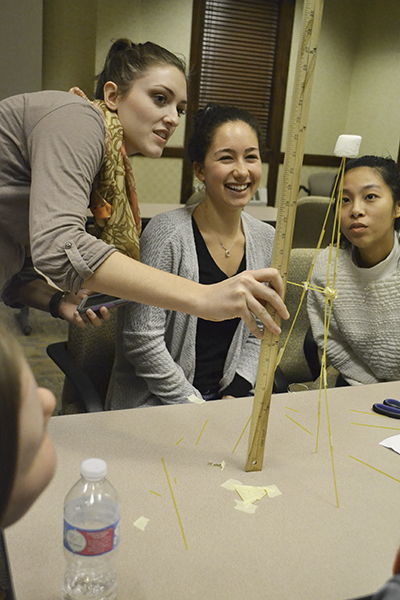
One of the two teams has their spaghetti-marshmallow tower measured to see if they built the tallest tower and won the competition.
Students who complete the WIE Leadership Certificate may count it towards earning the campus leadership certificate, a very robust program that includes attending workshops, taking classes, and meeting with a leadership coach. WIE leaders consider the Certificate to be “an introductory program to get our women keyed into the skills and the attributes they need to become leaders,” says Wolters. “This is kind of that first stepping stone and that entry level point so that they can use the campus resources that already exist.”
How have students benefitted from WIE Lead? Engineering student Jessica Lothridge indicates, “I think it’s a good opportunity to meet other people, first of all. Second of all, to really learn about the things that make a good leader. Honestly, it’s really uplifting and inspirational every time I come.”
Wolters hopes the program helps the students be successful in their careers.
“My hope,” adds Wolters, “is that those who participate are able to have a takeaway of the skillset that they don’t have a chance to develop elsewhere, so they’re taking away the skills that are going to help them succeed in the workforce. We’re a great school, and we do a wonderful job of training our students technically, and I just want to ensure that these women have a chance to develop these additional personal skills, professional skills, so they feel empowered to be leaders.”
Story and photos by Elizabeth Innes, Communications Specialist, I-STEM Education Initiative
For more related stories, see: Engineering, WIE, Women in STEM, 2016
For additional I-STEM articles about WIE Camp, see:
- WIE Orientation 2015 Shows Female Engineering Freshmen the Ropes
- WIE Camp 2014: Creating Community for Female Engineering Students
- Women in Engineering Camp Facilitates Relationship Building
- From WIE Camp to Seniors: Two Future Engineers Credit Illinois' Community of Support
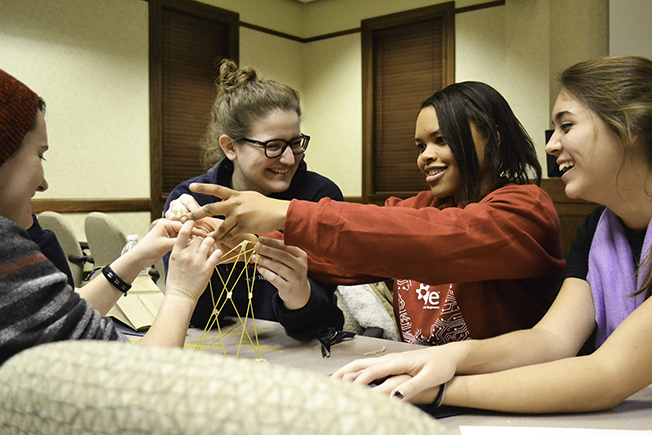
Teammates enjoy the hands-on activity building a spaghetti-marshmallow structure during the WIE Lead Collaboration workshop.
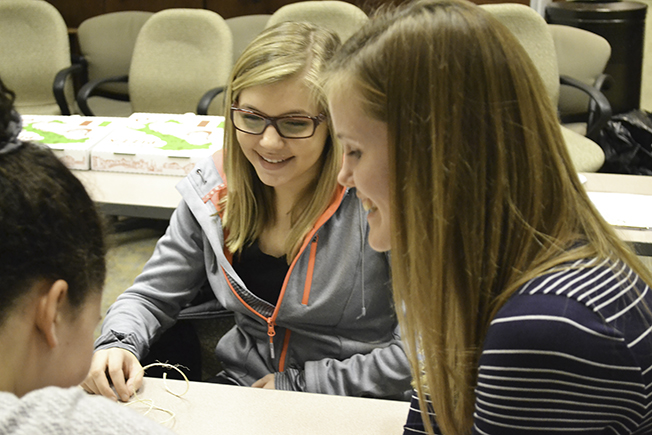
Sarah Laken (right) and the other members of her team collaborate during the hands-on activity.













.jpg)
















